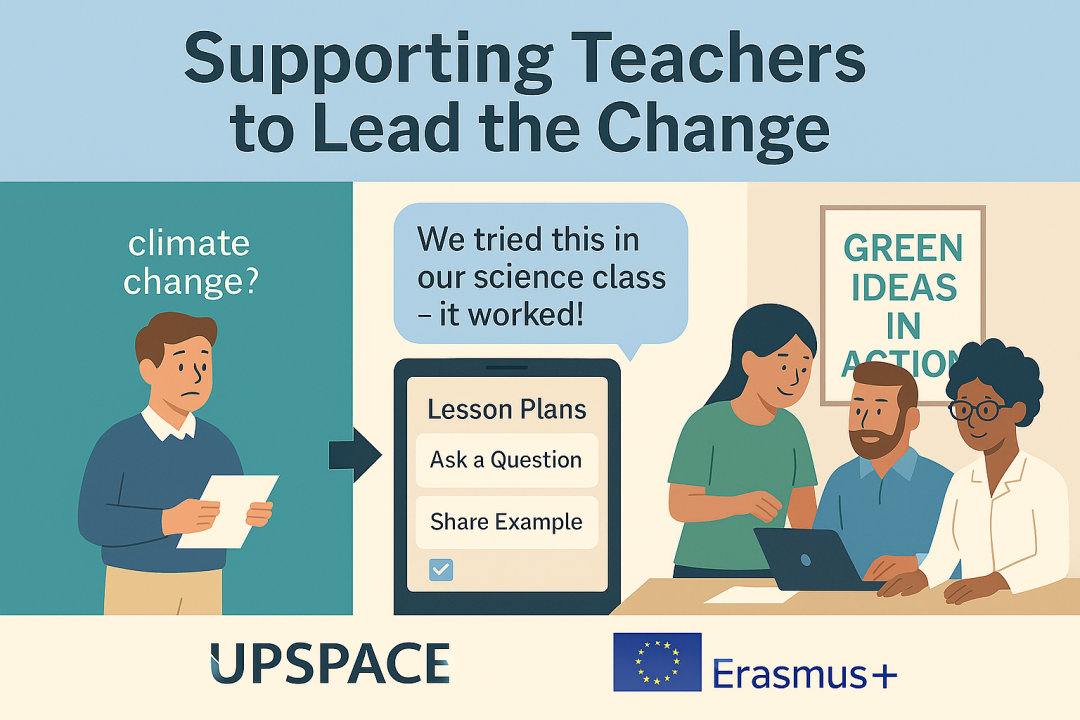Teachers play a vital role in shaping how young people understand and respond to the world around them. As climate change, environmental conservation, and sustainability become increasingly critical topics, they need to be introduced in schools in a more prominent way. However, many educators find these topics daunting, often lacking adequate guidance, relevant resources, and structured training to effectively integrate them into their teaching. Traditional curricula typically approach these issues superficially or not at all, leaving teachers uncertain and students unprepared for future environmental challenges.
The UpSpace project seeks to change that. It doesn't expect teachers to become experts in environmental science or climate policy. Instead, it offers them tools that are easy to implement, thoroughly tested, and adaptable to schools with different levels of experience, infrastructure, and support.
Blended learning: Online and hands-on teacher training
At the heart of UpSpace’s strategy is a blended learning course, designed to empower teachers with both foundational knowledge and practical experience. It starts online, where educators can explore the foundations of green education. Green education encompasses a holistic approach to learning that integrates sustainability principles into all aspects of teaching and curriculum design. It helps students understand the interconnectedness of ecosystems, economy, and society, encouraging critical thinking, problem-solving, and active citizenship in environmental issues.
Educators are introduced to concepts such as ecological footprints, resource conservation, circular economy, and climate literacy. Teachers also explore best practices and discover various engaging activities tailored to different subjects and student age groups, providing practical ways to integrate sustainability into everyday lessons.
Later, selected teachers meet in person to visit schools in partner countries, collaborate with peers, and test new methodologies together. This way, teachers see that they are not alone; others face similar challenges, such as limited time for preparation, insufficient resources, lack of administrative support, uncertainty in addressing complex environmental topics, and difficulties integrating sustainability across diverse subjects. Sharing these experiences helps educators realize common solutions and strategies, building confidence and fostering a supportive teaching community.
Train-the-trainer: Multiplying impact and building capacity
UpSpace also adopts a dedicated train-the-trainer model, a highly effective approach to scaling educational impact. Selected teachers undergo intensive training delivered by project experts, equipping them not just with knowledge but also with skills to mentor and inspire their colleagues. This model significantly extends the reach of training efforts, creating a multiplier effect and ensuring sustained change within educational communities. Benefits of this approach include fostering leadership skills among educators, enhancing peer-to-peer learning, and strengthening school-wide adoption of sustainability practices.
Teachers involved in train-the-trainer sessions gain expertise in:
- Urban regeneration and sustainability: Understanding and teaching sustainable urban transformation. Teachers gain a deep understanding of how urban spaces can be sustainably transformed to enhance community well-being and environmental health.
- Upcycling in education: How to engage students creatively in sustainability measures by turning waste materials into useful educational resources.
- Digital competencies and the UpSpace platform: Participants are trained in leveraging digital tools and the UpSpace platform effectively, facilitating collaborative learning and continuous professional growth.
- Interdisciplinary methodologies: Teachers are introduced to approaches that integrate sustainability into various subjects, promoting holistic education.
- Student-led projects: Educators receive practical guidance on facilitating student-led initiatives, empowering young learners to become active participants in community sustainability efforts.
An educational toolkit developed from these sessions further ensures sustained application and integration into everyday teaching practices long after the project concludes.
Building sustainable communities through education
Through its teacher education strategy, UpSpace builds internal school capacity to sustain and grow urban regeneration efforts. Educators are not left on their own. They become part of a broader network via the project's online platform, where they can exchange ideas, ask questions, and showcase results. This community-driven, teacher-centered model turns schools into living labs of sustainability, powered by educators who are trained, confident, and supported.
If we want education to prepare young people for a green transition, teachers must feel ready and empowered to lead the way. And with the right training, tools, and community, they absolutely can.
